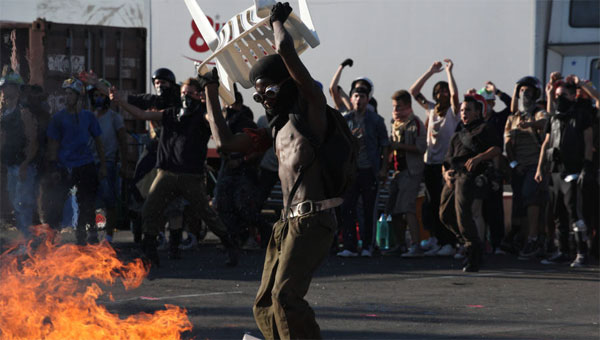Diaz: Don’t Clean Up This Blood Review

Diaz: Don’t Clean Up This Blood is uncomfortable.
A two-hour political thriller depicting the final days of the 2001 G8 Summit in Genoa, with the core focus being the brutal attack of 90 activists by 300 police. It left my cells turgid, as if the air was slightly hotter and thicker as I stepped out of my seat.
I’ll prefix this review with an admission – I’m no staunch politico.
The goings-on of global affairs interest me, but I’ve spent the majority of my years naively sidelining world politics in favour of high-falutin literary tomes written by dead men.
Old habits die hard, but I want to be informed blah blah blah.
So the thought of having to bosh out a political review felt a bit like how I imagine Li-Lo feels on a trip down the STI clinic.
I needn’t have worried.
Diaz tells the story of the 2001 G8 Summit’s final days without pomp; combining real footage with dramatic reinterpretations based on the experience of real-life victims to create something incredibly watchable, yet eye-opening.
Of course, there’s an element of poetic licence that comes with film-making; it’s a piece of cinema, not a documentary after all. But the story is pretty close to the truth, and does away with the need for some asinine red-faced celebrity historian faffing about with rhetorical questions before striding out of shot.
The catastrophe Diaz explores is the planned attack by Italian police of a school they believed were harbouring protesters – or ‘black bloc’ as they spit venomously.
These black bloc were, they allege, violent activists destroying the city through vandalism and crime in their bid to stop the G8 Summit taking place.
In reality, the school was a refuge not just for activists and protesters, but also tourists and travellers caught up in the chaos of the G8 protests, as well as a media centre for international journalists covering the action.
A slow-motion shot of a bottle being hurled at a police drive-by became a symbolic catalyst for the police brutality that followed, with Diaz revisiting this moment several times to depict different viewpoints of the attack; from those inside the building, activists who were elsewhere and different political and police rank-members.
It’s a purely dramatic shot, but what a corker.
Early failures by police to control the protests stoke their fury and simmering aggression, unlocking what becomes senseless, bestial violence in many as we watch them break down the doors to the school and recklessly beat those inside; most of whom are stood with their hands up, in surrender.
It’s harrowing.
Humans trapped like cattle; trembling, pleading, beaten and blood-spattered.
The police’s carnivorous bloodlust and ruthless treatment of those inside the school – activists, tourists, journalists, travellers – reveal the kind of sadistic dehumanisation that unleashes a slew of wider social questions about those in power.
If justice’s moral compass is guarded by authority, what happens when corruption skews the dial?
Genoa 2001 was under the grip of a Berlusconi government, a man who only just this year lauded Mussolini’s “good traits” on Holocaust Memorial Day.
Now there’s a man with great social timing and an eye for virtue.
His attitudes toward left-wingers were cold to say the least, vitriolic perhaps.
What’s more, it’s now acknowledged that much of the vandalism and destruction of city property that took place for which the protesters were blamed, were caused by the hands of fascist gangs working in collusion with the police.
Diaz, although the most brutal, was not unique.
Fuelled by the Berlusconi establishment’s aggressive agenda to save face and prove they could maintain law and order, Italian police beat hoards of protesters, even white-handed pacifists.
Justification for their actions in Diaz came from lies and forgery of statements that those inside met them with violent attacks, planting molotov cocktails and a treasury of other weapons as ‘evidence’ of what was found on site.
In the film, an elderly man who’d sought refuge for the night in the school after hotels across the city were instructed not to let out their rooms whispers to an officer as he lies in hospital, “you really fucked up”.
Understatement.
Diaz is a sobering depiction of a truly shocking moment in our recent political and social history.
But as it’s mix of event footage and dramatic reinterpretations shocks me into outrage, I awake to news that two British soldiers, a former Private and current Lance Corporal, have admitted to the abuse of afghan civilians they’d been accused of.
Wherever there’s power, authority and an inflated sense of superiority or purpose, you’ll find the shits of our civilisation; those who elevate themselves at the cost and disregard of others.
It’s nothing new, and were it not for footage of the police attacking without cause and planting fake evidence, the truth may have been known.
Many of those involved in the Diaz raid have yet to answer for their crimes. The aforementioned two Brit soldiers’ punishment amounts to little more than slapped wrists.
But wait, aren’t we so civilized now?
Diaz: Don’t Clean Up This Blood is an important film, not just for telling the truth about an event that shouldn’t be forgotten, but for asking uncomfortable questions about the systems we trust to maintain justice in our society.
With the 2013 G8 Summit just around the corner, these are questions worth remembering.
Seraphina D’Arby